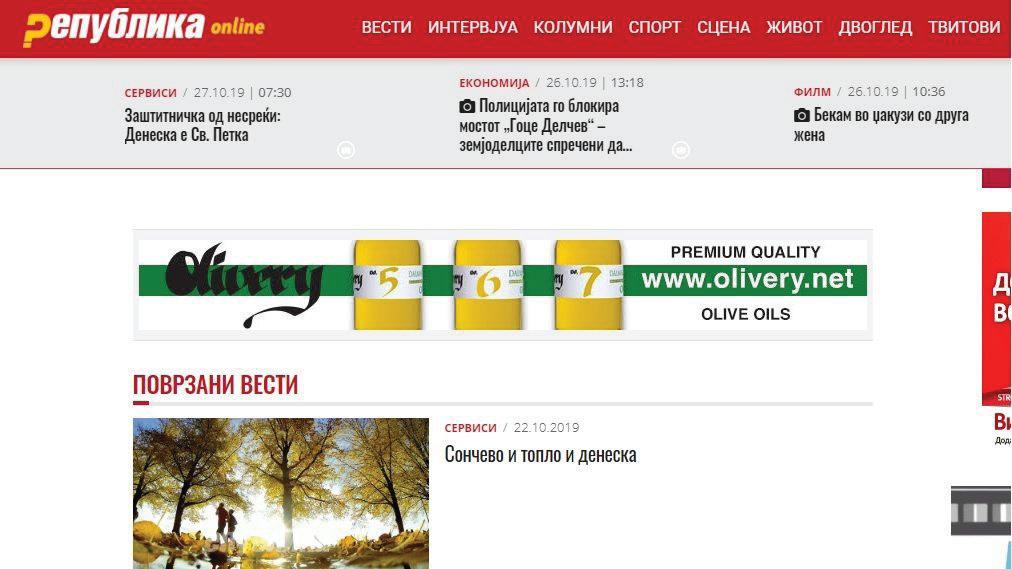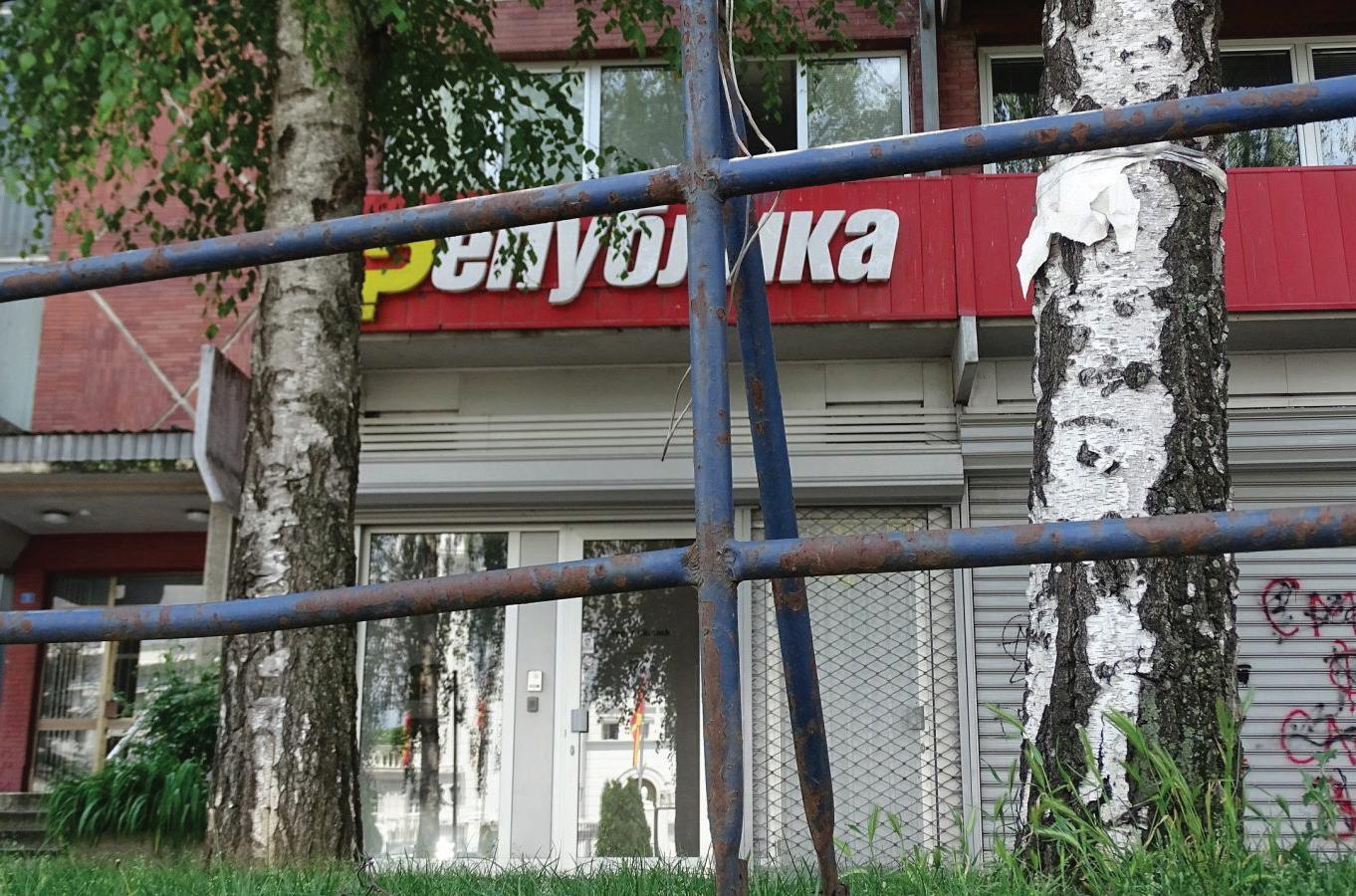
9 minute read
HOW HUNGARIAN OLIVE OIL KEPT MACEDONIAN MEDIA AFLOAT
from Reporter.al Numri 54
by Reporter.al
Hungarian ads have helped the survival of media supporting fugitive former Prime Minister Nikola Gruevski.
Boglarka Street in Budaors, a suburb of the Hungarian capital, 12 kilometres from Budapest, doesn’t look special on Google Street View. It resembles streets in many other suburbs in Hungary and Europe – family homes with yards, lawns, trees, cars parked in front of garages.
Advertisement
A small wooden house stands at the dead end. It is the registration address of Olivery, a Hungarian company selling olive oil that is made in Croatia, but which was advertised only in certain media outlets in North Macedonia. Until recently, Olivery adverts dominated the websites ofKurir, Denesen, Republika, Lider and others. But it disappeared at the beginning of this year and can now be seen only on Alfa TV.
Other small Hungarian companies placed adverts in these same media outlets, and some still do, like Bonyart, an online shopping agency, marketing home decorations such as fridge magnets and door plates. Another is Skin Delight, a cosmetics company. GOCE TRPKOVSKI | BIRN | SKOPJE
Hungarian ads filled the gap after change of power: A quick look on the media outlets where these adverts were placed reveals that they were not chosen at random. All of them belong to the group of so-called Hungarian media in North Macedonia, controlled by three companies. They earned this nickname after Hungarian capital was injected in them by people seen as members of Hungarian Prime Minister Victor Orban’s propaganda structures. Some of these media used to be owned by obscure companies based in the Central American offshore haven of Belize.
The editorial policies of all of them were, and still are, strongly supportive of the former ruling VMRO-DPMNE party in North Macedonia – and hostile not only towards its main rival, the Social Democrats, SDSM, but towards everybody else that the former ruling party saw as an opponent.
Under the VMRO-DPMNE government, which was ousted in mid-2017, these media outlets used to run adverts of government campaigns and of larger domestic companies.
One of the companies behind the websites, Em Media, received 25,000 euros in two months in 2015 directly from the then government, open source treasury data shows.
The same data reveals that a number of state institutions, such as the ministries of Economy, Education, Transport and Communications, Environment, as well as the state agencies for employment and land registry – all placed adverts on Em Media’s websites for between 250 and 500 euros a time.
Another media company, Prva Republika, received 32,000 euros in 2015 from the North Macedonia’s government filed under “other contractual services” without further specification. It published a lot of adverts from other institutions as well, and charged them for that.
After the VMRO DPMNE-led government under Nikola Gruevski lost power, problems emerged in these media.
In 2017, there were delays in paying salaries. Some of the outlets had to close down, such as Republika print magazine, Radio Free Macedonia and TV Nova. Others were reorganised and introduced new programs.
But for these, when the state adverts from North Macedonia ceased, new ones from Hungary filled the gap.
In mid 2017, long before Gruevski
Oil advertisement. Photo: Prizma.mk
fled from Skopje to Budapest to avoid serving a prison sentence, a couple of Hungarians, Peter Schatz and Agnes Adamik, both former directors in the Hungarian state broadcaster, moved in the opposite direction, making a grand entrance in the North Macedonia media market.
Players operating through multiple companies: Olivery olive oil was one of the main sponsors of the media supporting the former ruling party in the period after the government in North Macedonia changed.
It supported newsrooms of three or more journalists, commentators, cameramen and other staff, according the impressum sections on their websites.
Searching through past online content with specialized tools reveals that the olive oil adverts started to appear in 2017, which is when Hungarian capital entered them.
The key players for distributing this capital were Adamik and Schatz. The websites supported by Hungarian capital are attached to three companies, Em Media, Prva Republika and LD Press Media.
Em Media owns the domains ofKurir, Deneshen, Vistina, Ekonomski and Zdravstvo. Prva Republika registered the Republika website and Pressing TV, an online television station. Lider used to be a website in the Em Media group, but was later acquired by its editor-in-chief LjupchoZlatev. Today it’s part of Prva Republika.
LD Press Media is the publisher of the Netpress news agency, formerly owned by the Finzicompany. This company and its late owner, Kosta Krpach, who was found dead with a gunshot wound in his apartment in Skopje in 2016, aged 40, were involved in acquiring Israeli wiretapping equipment for the secret police. The Special Prosecution Office, SJO, in North Macedonia, has investigated this case, dubbed Trezor, which is now in court. All three companies have the same majority owner, the Adinamik Media Company, founded on September 26, 2017, fully owned by Adamik.
Schatz is the majority owner of Alfa TV through four companies. Alfaskop is the name of the company directly owning Alfa. It is owned by four companies, of which CHS Invest Group holds the majority share. The majority owner of CHS is Target Media, which Schatz owns. It was registered on April 11, 2017.
BIRN sent questions to the management of every company running the “Hungarian” media concerning the adverts from Hungarian companies. We asked whether they had approached the companies, or were approached by them, what kind of advertising packages were agreed, and

whether there is any interest in their products on the North Macedonian market, among others.
We received answers from Lidija Stanchevska Kumeva of LD Press Media, about the ads for Skin Delight, and from JaniBojadzi of Alfa TV, about the olive oil.
“Skin Delight was running ads on the internet pages of Netpress news agency in accordance with contracts reached through making offers that cannot be revealed due to the business confidentiality of both companies,” Kumeva told BIRN.
She added that the news agency had no knowledge of whether there was any interest in the company’s products on the North Macedonian market, suggesting we put this question direct to Skin Delight.
Bojadzi also said that information concerning the cooperation between the TV and the company was confidential, and the companies could reveal it only if they wanted to.
“The companies regularly fulfill their obligations towards Alfa Television as specified in the contracts for cooperation. When I became the manager of Alfa (on August 18, 2019) the companies that you mentioned already had signed contracts, so I don’t know how the cooperation was established. We cannot answer the other questions as they are not a part of our business operations registered in the Central
Screenshot from Republika. Photo: Prizma.mk

Registry of Macedonia,” Bojadzi said in an emailed response.
Little money for lots of commercials At first glance, there is nothing peculiar about Hungarian companies advertising in Hungarian-owned media in Macedonia. However, Olivery is not a big company with international distribution. A small business, established in 2017, in its first year it had a total income of about 5,000 euros. The next year, in 2018, it earned 7,000 euros, of which 4,100 euros was profit, according to data that we obtained. Despite this small cash flow, the company was promoted in the top advertising spots on the websites for more than a year, and still advertises on a national TV station. At one period it was the only sponsor of two websites, Lider and Deneshen.
The peculiarities with this company don’t end there. Olivery sells olive oil for 15 euros a liter, plus delivery charges. The total price can reach up to 70 euros per bottle, to reach Skopje from Budapest. According to the adverts, it’s regular olive oil and is not presented as a product with special health benefits. It’s not presented as any different to the other olive oils being sold for five to seven euros a liter in supermarkets around North Macedonia.
Even at this highly uncompetitive price, it still advertises in North Macedonia. The BIRN investigation
Media company Prva Republika. Photo: Prizma.mk

showed that the adverts cannot be found anywhere else but on North Macedonian websites.
Bonyart, on the other hand, is not a separate company but a service owned by a larger firm, named Yozzi, which earned a profit of just over 8,000 euros in 2017 and around 6,000 euros in 2018. According to Hungarian media, the figure behind it was Miklos Bonyar, a former Hungarian politician who owned several media outlets in the early 2000s but later withdrew from the media and politics and got involved in other businesses.
Skin Delight is not even a company. It is registered as an individual entrepreneur, which is why data about its income is not publicly available. The owner, Lila Kosa, is a former Budapest lawyer who changed her occupation after a three-year stay on Bali. It has advertised in North Macedonia in Hungarian. Clicking Skin Delight’s banners takes Macedonian readers to the Hungarian version of its online shopping website.
Acting on advice of a mysterious friend The owner of Olivery did not respond to emailed queries about why the firm entered the Macedonian market with such uncompetitive prices. But the owner, named Peter Pascay, speaking a while ago to the Hungarian website of Magyar Narancs, said the adverts run in the North Macedonian media did not cost much, and he was only obliged to pay if somebody ordered his product.
Both Pascay and Bonyart in separate interviews told Magyar Narancs that “a friend” had suggested they advertise in North Macedonia after they revealed plans to expand their businesses. Lila Kosa told Magyar Narancs that she would only talk about “the beauty of life”, and refused to be quoted in articles related to politics.
While Olivery remained silent, Bonyart responded to BIRN’s questions through Facebook messenger. It told BIRN that it was expanding in many countries and had tried to enter the market in North Macedonia through the commercials. However, after the contracts expired, it decided to stop advertising. It revealed nothing more about its advertising arrangement (fixed amount or per sale), appealing to business confidentiality. Bonyart did not reveal who the mysterious friend was, either, saying it was not a question of concern to the general public. Asked whether it was familiar with the editorial policy of the websites where it used to advertise, it responded that its primary interest was business not politics.
“The only places where we would never place ads are fascist websites. But we trust our friend that he would never recommend such sites to us. We highly value the work of journalists and media and understand its importance. That’s why we’re open to questions,” the company responded.










